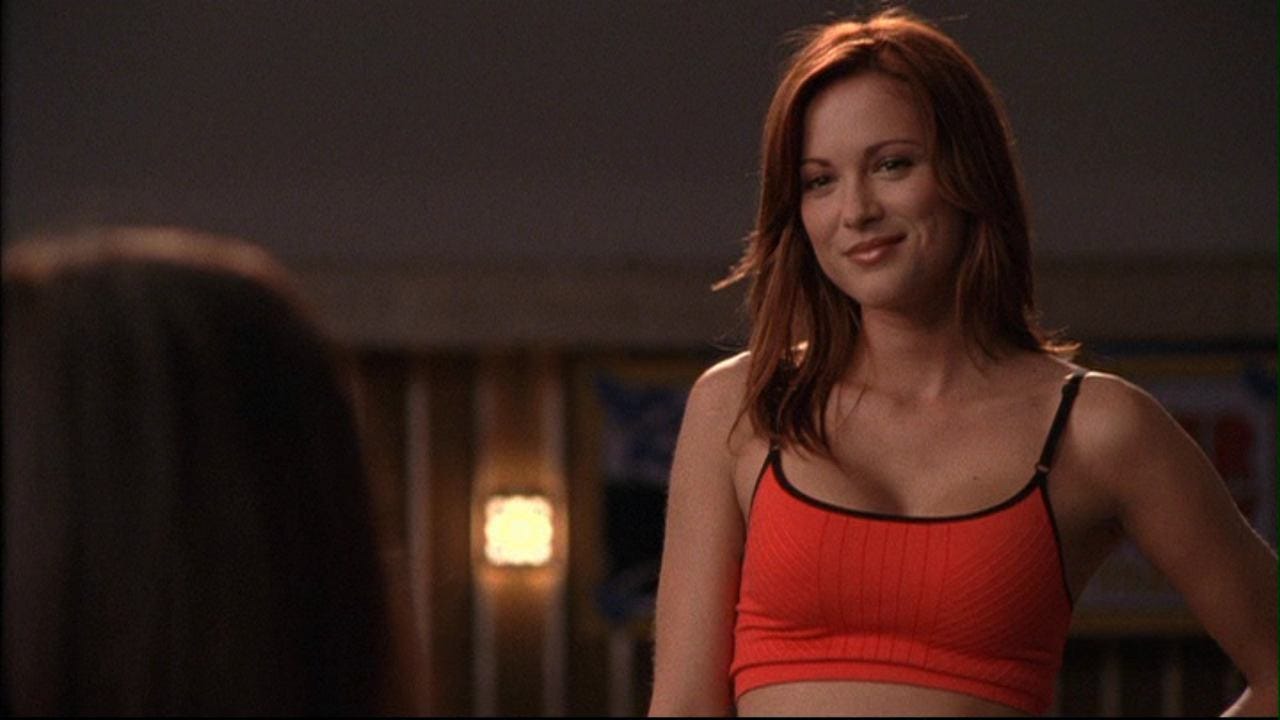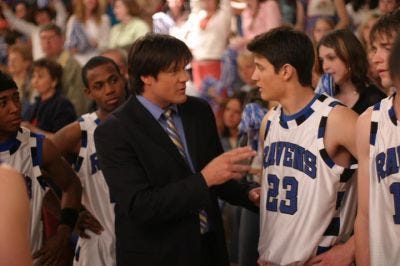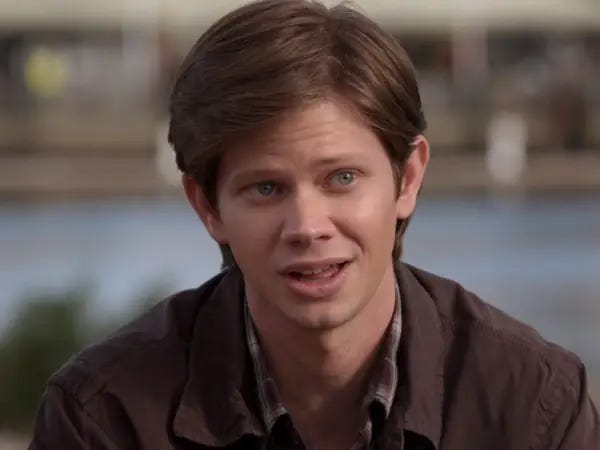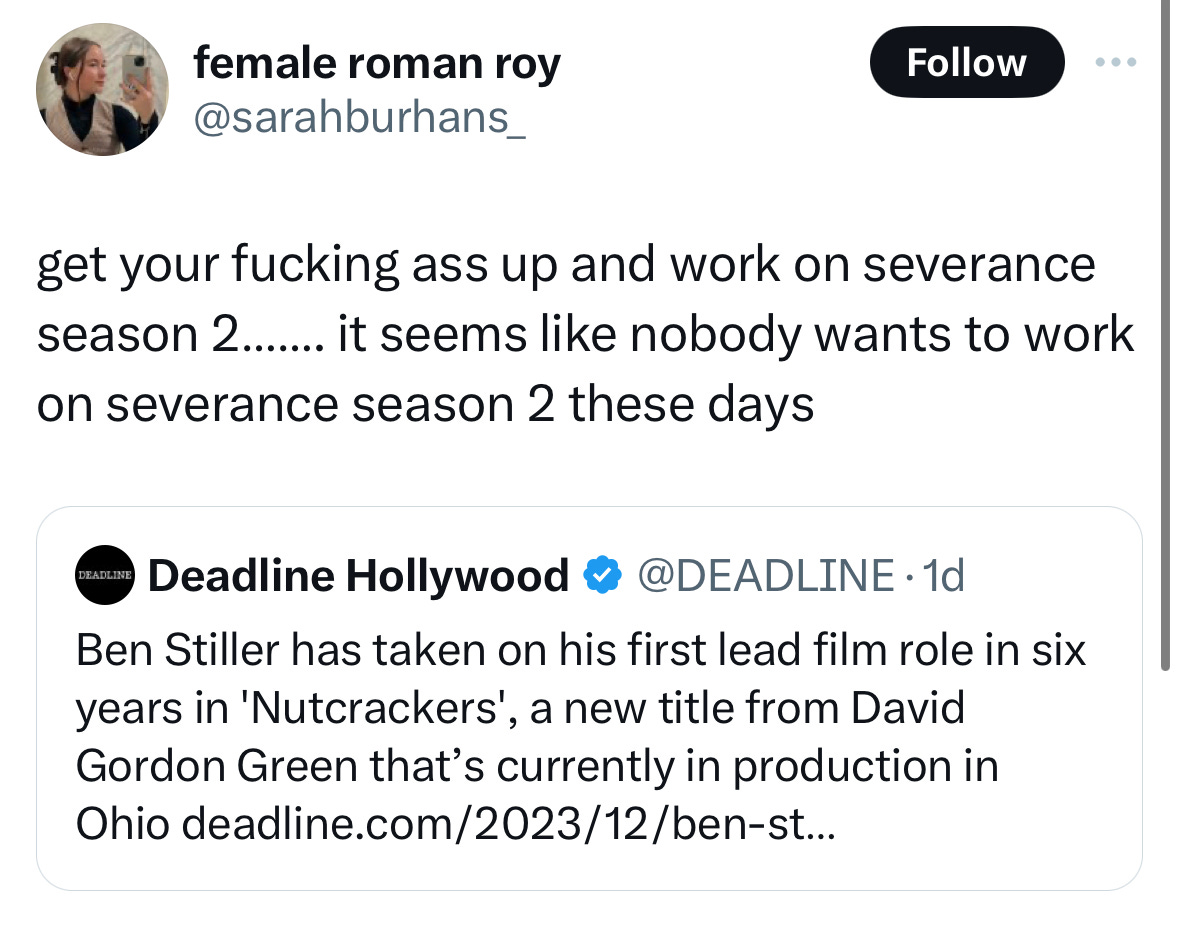Who Are We Willing to Forgive?
On redemption arcs and my ongoing beef with a 20-year-old teen drama
A Game of Thronesian surprise death or Grey’s Anatomy-style new-job departure will always hurt. But there’s one television exit I haven’t been able to shake for years, so much so that I wrote about it recently for Paste Magazine’s “It Still Stings” series in which writers relive emotional TV moments they just can’t get over (something Rachel and I have much familiarly with because, as you can probably tell from this newsletter, these two besties know how to hold a grudge). My ire is not because I necessarily loved the character or because I loved her relationship or even because I loved her friendships. Instead, I mourned what could have been, what the show gave up by giving her the boot.
In season seven of One Tree Hill — after she’d hit rock bottom multiple times throughout the series only to be transformed enough each time to make a slight comeback — Rachel Gatina (Danneel Ackles) makes a final return. She’s nearly unrecognizable, making her re-entrance feel more like the introduction of a brand new, Lady Macbeth-like character, with no signs of the loyalty or compassion she had let slip through her hard exterior in the earlier seasons. She’s now the wife of Dan Scott (the show’s biggest villain) and the producer of his show Scott Free Redemption, an attempt at restoring his public image. She’s greedy, bordering on evil, pushing Dan to betray his family for money. The last interaction we see between her and her ex-friend Brooke (Sophia Bush) — the only time in her final story arc that she attempts an apology — results in Brooke slapping her. The final words between two women who once had the most interesting friendship on the show are “Stay away from me, bitch.”

Rachel’s disintegrating moral compass is used to magnify Dan’s developing one, and the dynamic culminates in her final moments on the show, when Rachel learns that Dan has left her with nothing.
“Forgiveness doesn’t exist. You’re simply what you do and how you pay for it,” Dan says, talking to both the audience of Scott Free Redemption and his wife. “So remember that when you practice whatever evil’s in your heart, or when you cheat or steal or lust or hate or gossip or covet, or whatever it is that you do, or you’re planning to do, or you have done. There is no forgiveness.”
For Rachel, that was true.
But for nearly every male character on One Tree Hill, it wasn’t. The fact that Rachel was driven into the ground hurts even more because redemption is baked into One Tree Hill’s ethos from its first episode, which shows Nathan — who later becomes one of the most loved characters on the show for being a good brother, husband and father — being cruel. The show’s main patriarch, Dan, was already every character’s enemy when he shot his beloved brother at point blank range in season three. But, after many ups and downs, he ends the show dying with his family by his side, mourning the loss. Even Jimmy Edwards, who brought a gun to school and shot a student in one of the show’s most well-known episodes, makes a turnaround in death that is supposed to convince the audience his actions were justified because he was bullied.

One Tree Hill isn’t alone in its affinity for redemption arcs. Television itself is obsessed with the story of a phoenix rising from the ashes and I don’t mean an underdog story as much as writers affording characters who don’t deserve forgiveness somewhat of a clean slate. But the rate at which they dole out these second chances are clearly uneven — yes, I’m saying “rate” like I am going to provide you statistics even though I am really just going to pretend my opinion is fact, a favorite pastime. But I can tell you with confidence that the number of times I’ve been swindled into liking a character who has done a despicable act just because they’re a hot, rich man is too many. The same opportunity for redemption is rarely afforded to people who are poor or on the fringes of society or simply unlikable women. Rachel’s arc, or lack thereof, stings particularly because television shows are addicted to putting unworthy characters on a pedestal.
Rachel was primed to be hated the moment she stepped into the world of One Tree Hill during the show’s third season. Dressed as Pamela Anderson, she kicked off her rivalry with Brooke by trying to steal her boyfriend, and went on to co-opt Brooke’s cheer squad, flirt with even more boyfriends/husbands, and insult nearly everyone she comes into contact with. The major traits of her character were that she’s promiscuous and that she used to be fat and got plastic surgery to look the way she does — both of which are weaponized against her, as if being overweight, liking sex or changing your body is a crime. But overtime, her hard exterior softened and she won over the Tree Hill gang. The show even appears to question its own intentions in making Rachel’s looks and sex life her “bad” characteristics — albeit sometimes via annoying men telling her, “you need to love yourself” but hey, it was the early 2000s. Rachel’s character finally peaks when she is kicked out of high school for trying to help Brooke, and their friendship turns into one of my favorites of the entire series.
Then, Rachel became a punching bag.
Her first exit from the show came after she convinced the beloved character (and one of the aforementioned annoying men) Mouth to leave Tree Hill with her, then ditched him for another guy. Everyone who had become Rachel’s friend (and some random men Mouth meets in jail after getting arrested on this road trip… I love teen dramas!) called Rachel a slut and told Mouth he doesn’t need her. The disgusting way Rachel’s character is handled is made even worse by the fact that there was so much potential in her. With Rachel, the show dipped into conversations around fat shaming and slut shaming in a way it never did before and never did again. In the later seasons, it’s revealed that while Rachel’s character took a hiatus from the show, she'd been a sex worker and addicted to drugs. Instead of delving into anything meaningful around this, One Tree Hill used it as the beginning of her ultimate demise.

As I wrote in my first essay ever for this newsletter, art was perhaps imitating life on that set. In 2017, nearly 20 women from the cast and crew accused the show’s creator Mark Schwahn of sexual harassment, and psychological and emotional manipulation. The three main actresses (Sophia Bush, Hilarie Burton and Bethany Joy Lenz) on their rewatch podcast Drama Queens, allege that much of the on-screen choices were a reflection of what was happening behind the scenes. In one episode, they say that the jokes made at Rachel’s expense were punishment for Ackles rejecting the creator’s advances. If the accusation is true, it adds a darkness to Rachel’s arc that rivals anything the writers could have come up with. Even if it isn’t, her character’s downfall hurts all the same — or perhaps more when we look at who television has offered redemption.
Take Damon Salvatore. Before The Vampire Diaries girlies come for me, I also loved Damon. Everyone did! If you’d like to be cured of this, may I suggest watching Harper's Bazaar’s “Everything Ian Somerhalder Eats in a Day” video which is absolutely bonkers? I watch it at least once a month just to be sure I didn’t imagine things like him throwing two handfuls of raw vegetables on his plate at breakfast. There’s something about him saying “no nonstick, it is as toxic as the day is long” that gives the same energy as Austin Butler talking in that Elvis accent for years … I can’t explain it but I don’t like it one bit. Anyways, Damon was a monster and I don’t mean because he was a vampire. The introduction to his character is him taking full control of Elena’s self-involved but innocent cheerleader bestie Caroline so he can do whatever he wants with her sexually. He manipulates, lies, murders and more, but he’s also fun, and hot. And for this, he is rewarded with a redemption arc that spans the life of the show, including a friendship with Bonnie that has overtime become a favorite (maybe because this show treated Bonnie horribly elsewhere) and of course, becoming the show’s ultimate ship. It doesn’t matter that Damon started the show with sexual assault — I’m doomed to watch him and Elena yell “Because I love you”/“Then stop loving me”/”I can’t” back and forth over a trending song in the form of clips on my Instagram for eternity. Those two will literally be yelling “WE’RE TOXIC” and the comments will be like “why can’t I find a man like this😭.”
But I can’t judge. Just a few weeks ago I wrote about how I grew up thinking Chuck and Blair exemplified true love. You may all be sick of us talking about Gossip Girl but we can’t talk about undeserved and potentially harmful redemption arcs without talking about Chuck Bass. The hotel mogul traded his girlfriend as a sexual object to his uncle in exchange for a building, shares details of her sex life to Gossip Girl while she’s dealing with a pregnancy scare, and constantly belittled her — and that’s only what he did to someone who is supposed to be the love of his life. Chuck sells people out and puts money above his loved ones constantly, and yet, in the end, he’s still a fan favorite. His redemption arc resulted in him getting everything he could have wanted: Blair, their child, money, an Upper East Side apartment, a hotel and more.
The same can’t be said for the fifteen-year-old he attempted to rape in the pilot: Jenny Humprey, who topped our recent list of Gossip Girl characters who deserved better. Jenny started out the show naive and likable as the audience’s view into the world of Manhattan's elite (yes I’m ignoring Dan). But over the course of the show, Jenny was sucked into a void trying to be everything Blair and Serena were and she could never be. She schemed, she betrayed her best friend Eric countless times, she was mean. But while her crimes were miniscule next to Chuck’s, her exit from the show brings the comparison between his redemption arc and her mistreatment to the forefront. When the two of them sleep together, Jenny is banished from New York City (Eric Adams has nothing on Blair Waldorf) and Chuck hits rock bottom only to begin his rise to a happy ending.
When we begin to compare the storylines and departures of unlikable women to their male counterparts, it’s easy to find missed opportunities everywhere you look, from Rachel in OTH, Jenny in GG to someone like Monica Gallagher from Shameless or dare I say, Terri Schuester from Glee. Other than being women, these characters embody what we're often told is the worst a person can be: someone who feels sorry for themself, who can’t help themself, or who tries and falls clumsily back to the ground, grasping onto a stronger person’s ankle, begging for help we’ve decided they don’t deserve. It’s scary to watch desperate characters because it’s possible we’ll see ourselves in them. We measure our relation to characters by wanting to be like them (ex. high-powered surgeons like Christina Yang) or using them to feel better about ourselves (ex. floundering millennials like Hannah from Girls). Anyone in between loses our interest, and we don’t want to stick around long enough to watch their redemption arc. Perhaps it’s easier to admire self-sufficiency in a psychopathic narcissist than it is to watch someone need help and not receive it.
Of course, there are exceptions. Mellie Grant started off Scandal as the hated, irritating first lady despite it being her husband, the president, who is having an affair. But in the end, she gets to the Oval Office herself. Since then, more unlikable women have gotten their own shots at redemption. And smart shows like Succession toy with this kind of character we tend to write off. As an audience we may have scoffed at Kerry’s pill bottles spilling out of her bag as she’s being evicted from Logan Roy’s house after his death. But the show does make her a sympathetic character in the end, and perhaps asks us to reckon with why we’d turn our backs on one of the few characters in the show who might be in our tax bracket.
But as characters like Euphoria’s abusive Nate Jacobs get a chance to tug at our heartstrings while Kat Hernandez disappears, here’s to hoping for some more worthy comebacks in the future for characters who aren’t white, male and wealthy.
Television, as it does with many things in real life, provides us a mirror in which we can reckon with who we’re willing to forgive. Perhaps the redemption arcs of sassy, above-it-all bad guys like Damon and Chuck have primed us to turn a blind eye to real life villains when they’re entertaining, like disgraced congressman George Santos. When Santos was kicked out of Congress, social media erupted with posts like “diva down,” and I laughed too. But watching him getting interviewed by comedian Ziwe this week — and unapologetically saying the most wild things like “Who the hell is James Baldwin?” — made me wonder if I was watching the beginning of, if not redemption, at least an erasure of his lies, transphobia and racism in favor of a more harmless persona. Once he’s proved his value to us as an entertainer, the rest is history. Writers rooms know this better than anyone.
And if television is in fact this influential in pushing our limits of forgiveness, the missed opportunities in redemption arcs on screen hurt even more. During one of her brief returns in season five of One Tree Hill, Rachel — who is pale, waxy and recovering from a recent overdose — whimpers to Brooke, “please don’t give up on me.” It’s a turning point for the show that could have provided an avenue to explore topics that were taboo when the episode aired in 2008, and we’re still wrestling with how to cover now.
In the end, Brooke does give up on her. But maybe it's telling that I haven't. I started this newsletter in May writing about One Tree Hill and now I'm ending the year writing about it again. I first watched this silly little teen drama when I was a teen myself and I'm still thinking about it now, but through different lenses. Television writers love redemption arcs, perhaps in part because television itself is constantly going through a cycle of redemption. Shows run for years and take different shapes, each season an opportunity to reinvent itself. And even when the show ends, its shelf life is long. The episodes don't change, but we do. Sometimes we demand more of them, other times we appreciate them in new ways. As Rachel (my beloved newsletter co-writer, not the unbeloved One Tree Hill character) and I said when we started this newsletter, TV shaped us. It put ideas and templates in our baby brains for how to live life — and a lot of those templates did not serve us well. But they're not permanently wedged in there; we can take them out and examine them, and still hold space to appreciate the shows that introduced them to us, like I said in the first essay I wrote about OTH. We can acknowledge we have a deep love for these characters and stories, and that we wouldn't be who we are without them. We can take the good and discard the bad, examining it in this newsletter on the way out. Maybe that in itself is a form, not so much of redemption, but of forgiveness.
B Plot
Question: What’s a TV show that you’d argue is a Christmas show?
Mallika: This is going to be a hard one to argue because I think there is maybe one Christmas episode over the show’s five-season run but The Fosters. What is my reasoning? Christmas = cozy + family time. The Fosters = cozy + family time. That’s literally the whole show. Plus, I rewatch the first season during the holidays, so explain that.
Rachel: I’m gonna say It’s Always Sunny in Philadelphia. There’s something about an Irish bar that always screams Christmas, and “A Very Sunny Christmas” is required holiday viewing for me every year. The graphic claymation, Charlie taking a bite out of mall Santa’s neck, Frank sowing himself into a leather armchair… They make me want to throw rocks at trains <3 Also The Marvelous Mrs. Maisel is a runner up, which is ironic because it’s supposed to be a Jewish show, but it is very wintry and nostalgic and Rachel Brosnahan ain’t Jewish anyway.
C Plot
We didn’t put this on our holiday gift guide because, contrary to popular belief, we actually believe in love and want your relationships to succeed. But if you really want to test how toxic your relationship with your partner is, head over to Heritage Auctions and bid on the scorpion paperweight Tom gifts Shiv in the last season of Succession. It’s only going for $155 right now, although emotional damages are not included.
Yesterday, Warner Bros. Discovery and Paramount Global held talks about a potential merger of the two media companies. According to Variety, the two companies are looking to combine their assets — TV, film, sports and streaming — to compete with Netflix, Disney+ and Hulu. If we have to live through another decade of people yelling about the “streaming wars” and pretending to be up in arms about costs while actually mooching off our parents just for all these companies to combine and form a cable company, we’re going to lose it.
Kate Winslet is playing what looks like Angela Merkel’s evil twin in a new Max miniseries called The Regime, created by Will Tracy, who wrote The Menu and several episodes of Succession. The trailer dropped this week and it looks like a romp. Though we wouldn’t expect anything less from a Kate Winslet-HBO collab. All that’s missing is a vape but we are holding out hope for its appearance as a key figure in the political thriller. Hugh Grant is also co-starring, though he’ll never have a better role than the Wanka press tour in which he plays a 63-year-old British man who has never hated his life more.
We hope you all have a restful holiday! Except for Ben Stiller who needs to get his ass to work.





